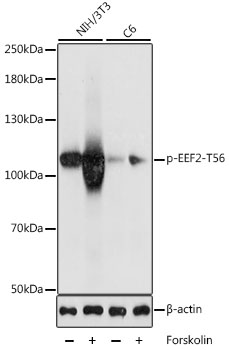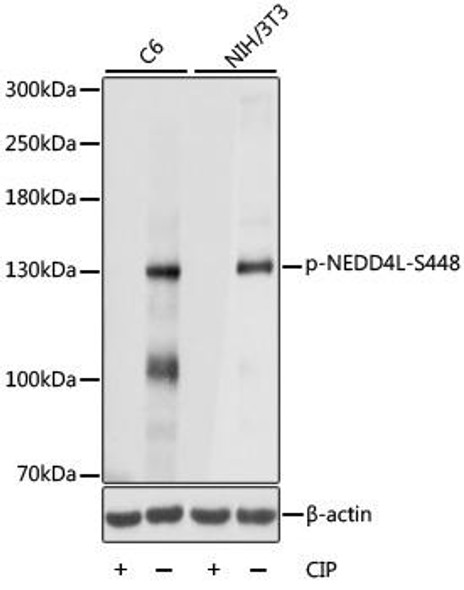Metabolism Antibodies 3
Anti-Phospho-EEF2-T56 pAb Antibody (CABP0832)
- SKU:
- CABP0832
- Product Type:
- Antibody
- Applications:
- WB
- Reactivity:
- Mouse
- Reactivity:
- Rat
- Host Species:
- Rabbit
- Isotype:
- IgG
- Research Area:
- Metabolism
Description
| Antibody Name: | Anti-Phospho-EEF2-T56 Antibody |
| Antibody SKU: | CABP0832 |
| Antibody Size: | 20uL, 50uL, 100uL |
| Application: | WB |
| Reactivity: | Human, Mouse, Rat |
| Host Species: | Rabbit |
| Immunogen: | A synthetic phosphorylated peptide around T56 of human EEF2 (NP_001952.1). |
| Application: | WB |
| Recommended Dilution: | WB 1:500 - 1:2000 |
| Reactivity: | Human, Mouse, Rat |
| Positive Samples: | NIH/3T3, C6 |
| Immunogen: | A synthetic phosphorylated peptide around T56 of human EEF2 (NP_001952.1). |
| Purification Method: | Affinity purification |
| Storage Buffer: | Store at -20°C. Avoid freeze / thaw cycles. Buffer: PBS with 0.02% sodium azide, 50% glycerol, pH7.3. |
| Isotype: | IgG |
| Sequence: | TRFT D |
| Gene ID: | 1938 |
| Uniprot: | P13639 |
| Cellular Location: | Cytoplasm, Nucleus |
| Calculated MW: | 95kDa |
| Observed MW: | 105kDa |
| Synonyms: | EEF2, EEF-2, EF-2, EF2, SCA26 |
| Background: | This gene encodes a member of the GTP-binding translation elongation factor family. This protein is an essential factor for protein synthesis. It promotes the GTP-dependent translocation of the nascent protein chain from the A-site to the P-site of the ribosome. This protein is completely inactivated by EF-2 kinase phosporylation. |
| UniProt Protein Function: | EEF2: a member of the GTP-binding translation elongation factor family. An essential factor for protein synthesis. Promotes the GTP-dependent translocation of the nascent protein chain from the A-site to the P-site of the ribosome. This protein is completely inactivated by eEF2 kinase phosphorylation. eEF2 kinase is normally dependent on Ca2+ ions and calmodulin. eEF2 kinase can also be activated by PKA in response to elevated cAMP levels, which are generally increased in stress- or starvation-related conditions. A variety of treatments known to raise intracellular Ca2+ or cAMP levels have been shown to result in increased phosphorylation of eEF2, and thus to inhibit peptide-chain elongation. |
| UniProt Protein Details: | Protein type:Translation elongation; Translation Chromosomal Location of Human Ortholog: 19p13.3 Cellular Component: polysome; membrane; cytoplasm; plasma membrane; cytosol; ribonucleoprotein complex; nucleus Molecular Function:GTPase activity; protein binding; GTP binding; protein kinase binding; translation elongation factor activity Biological Process: translational elongation; cellular protein metabolic process; translation; positive regulation of translation; peptidyl-diphthamide biosynthetic process from peptidyl-histidine; pathogenesis; hemopoietic progenitor cell differentiation; gene expression; post-translational protein modification Disease: Spinocerebellar Ataxia 26 |
| NCBI Summary: | This gene encodes a member of the GTP-binding translation elongation factor family. This protein is an essential factor for protein synthesis. It promotes the GTP-dependent translocation of the nascent protein chain from the A-site to the P-site of the ribosome. This protein is completely inactivated by EF-2 kinase phosporylation. [provided by RefSeq, Jul 2008] |
| UniProt Code: | P13639 |
| NCBI GenInfo Identifier: | 119172 |
| NCBI Gene ID: | 1938 |
| NCBI Accession: | P13639.4 |
| UniProt Secondary Accession: | P13639,Q58J86, B2RMP5, D6W618, |
| UniProt Related Accession: | P13639 |
| Molecular Weight: | 858 |
| NCBI Full Name: | Elongation factor 2 |
| NCBI Synonym Full Names: | eukaryotic translation elongation factor 2 |
| NCBI Official Symbol: | EEF2 |
| NCBI Official Synonym Symbols: | EF2; EF-2; EEF-2; SCA26 |
| NCBI Protein Information: | elongation factor 2; polypeptidyl-tRNA translocase |
| UniProt Protein Name: | Elongation factor 2 |
| Protein Family: | Elongation factor |
| UniProt Gene Name: | EEF2 |
| UniProt Entry Name: | EF2_HUMAN |







